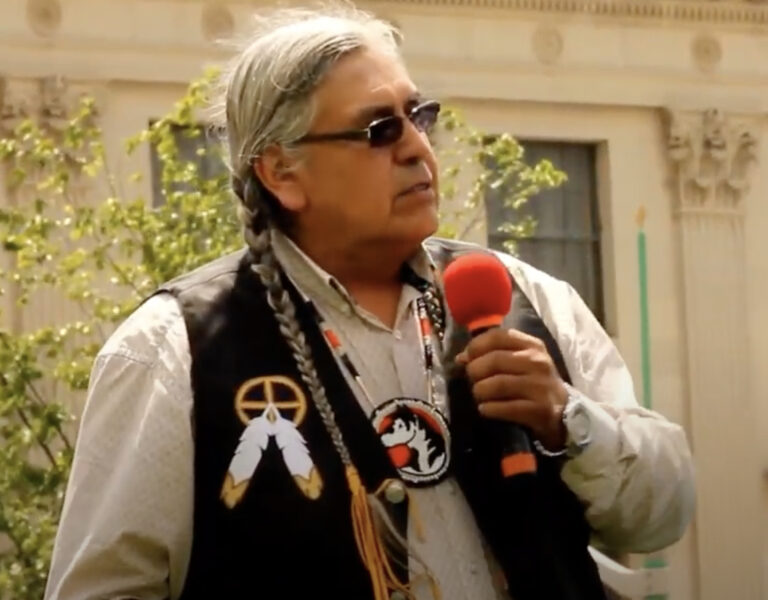
Federal Court dismissed a motion by former Onion Lake chief Wallace Fox and former Piapot First Nation chief Claude Friday for an injunction to delay Federation of Sovereign Indigenous Nations (FSIN) elections that continued as planned on Thursday.
A Federal Court spokesperson confirmed on Wednesday that the motion was dismissed from the Bench. Reasons for the decision were not yet available on Thursday.
The motion for an injunction followed allegations by Fox and others of interference and undue influence by acting chief Clarence Bellegarde and incumbent Bobby Cameron.
The last minute motion was denied after lawyers argued that FSIN is a voluntary membership organization in Saskatchewan and elections don’t fall under federal jurisdiction.
Claude Friday, Christopher Merasty, Colin Stonechild and Wallace Fox said they had submitted all the required information to become official candidates for positions on the FSIN executive, but when the list of candidates was released they weren’t on it.
The prospective candidates said they weren’t given reasons for being disqualified but the FSIN said letters were sent by the credentials committee to those candidates.
The would-be candidates say there were “discrepancies” with how the nomination process was handled by the FSIN election credentials committee.
The FSIN called allegations “baseless” and said elections would proceed as planned.
“The actions of these candidates and those members of the Senate is an attempt to subvert the resolutions and legislation of the FSIN Chiefs-in-Assembly,” the FSIN said in a statement.
An FSIN spokesperson told the Prince Albert Daily Herald earlier this month that there would be no further comment and did not respond to specific questions about the motion in court.
Fox said on Wednesday that he disagrees with the decision. He said the FSIN functions like a government body and that this decision leaves members with no recourse.
“If a staff for example got terminated, they have no recourse. If the chief found something illegal, they have no recourse — because it’s just a voluntary organization, according to FSIN legal,” Fox said.
“FSIN legal counsel misrepresented the FSIN (by) stating that it’s a non-government body.”
In an Order of the Court signed on Friday Judge Glennys McVeigh relied on a Saskatchewan Court of Queen’s Bench ruling that the FSIN election process is governed by its own “internal organizing documents and agreements” and is not under federal jurisdiction.
McVeigh also cited a previous ruling that described the FSIN as “a voluntary unincorporated association of the Chiefs in Saskatchewan.”
“The FSIN proposed both that of itself it may be a sovereign First Nations, or that it may be a voluntary political government composed of sovereign and independent First Nations,” McVeigh wrote in her decision.
“I find the determinative issue to be that FSIN is not a federal board or tribunal and therefore the Federal Court has no jurisdiction to decide the matter.”
McVeigh acknowledged that future decisions could come to a different conclusion.
Fox argued that the FSIN needs to re-examine its elections process to prevent similar situations from happening in the future. At first Fox said he didn’t want to air his grievances in federal court but he said inaction on the part of the FSIN made it necessary.
“There was no political will, or there was no communication, from the interim chair to try and resolve this internally — as it rightfully should have been. There’s no political will from the chiefs to move on this matter,” Fox said.
“Apparently the Senate are really sincerely trying to resolve this. Not because they support me — and I want that for the record. It’s to make sure that (the FSIN) are following their own laws and legislation.”
Earlier this month senators had joined in asking the FSIN to examine those allegations and postpone elections in case any disqualified candidates were in fact eligible.
“The majority of senators in the FSIN want to support all candidates to have a fair and equal opportunity to run in our election,” FSIN senator Roland Crowe said.
“Our Institution needs to be transparent with our democratic process if we want good candidates to come forward to run in our elections.”
Senator Chuck Thomas sent a letter to the FSIN addressed to Belgarde requesting a meeting to address those concerns and alleging mismanagement of the process.
“It is the position of the FSIN Senate that these outstanding election issues have to be resolved internally and to date we do not see any political will to get them resolved,” Thomas wrote.
The FSIN said its current election act is “clear” with respect to the documents that prospective candidates must provide to the credentials committee and the deadline to be eligible as a candidate. The FSIN said the current 13 candidates provided all the required materials and documents by the deadline.
The FSIN said any allegations that elections organizers were subject to undue influence or interference in the execution of their duties is “without merit, and completely unfounded.”
A total of 13 candidates were approved by the credentials committee to run for all five of the FSIN executive positions.
Chiefs and councillors of 74 member First Nations in Saskatchewan vote in FSIN elections.
This report was updated on October 29, 2021 to include new information from the Federal Court
